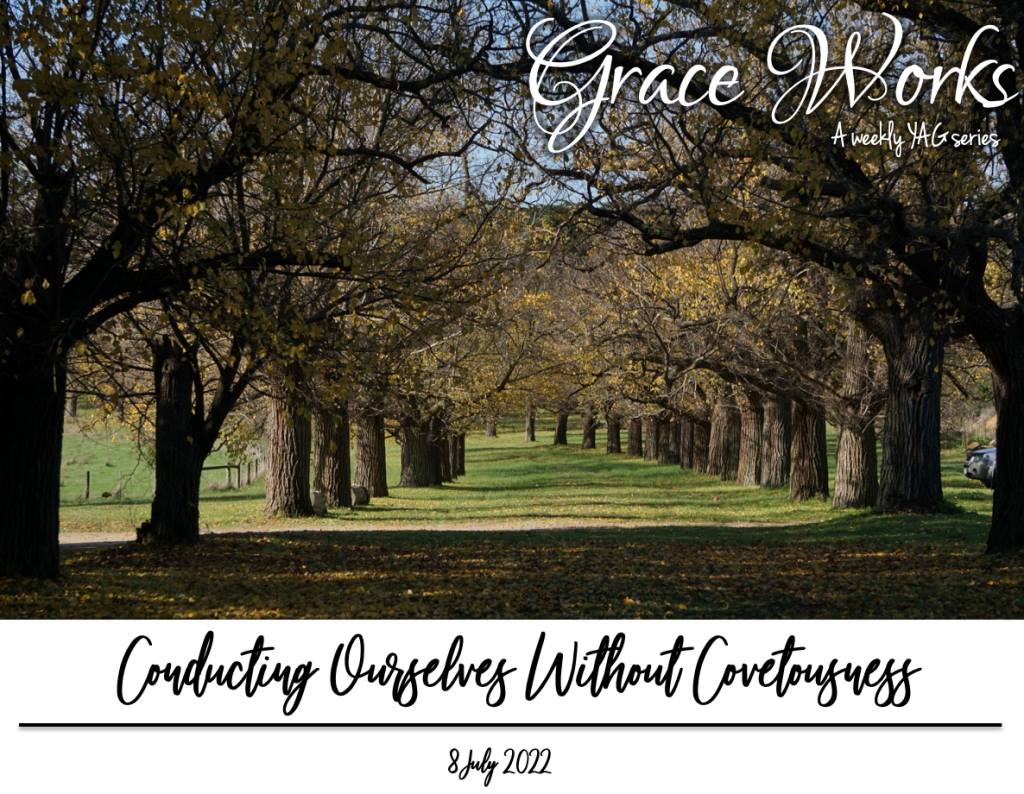Conducting Ourselves Without Covetousness
by Pastor Mark
July 08, 2022
Dealing with the problem of covetousness
The world is filled with many material things that call for our attention. Our eyes and hearts are drawn to covet these physical attractions. This is especially so when we compare ourselves with others who have more. The tendency of the heart is that we also long for what they have. Covetousness is a deep-seated problem. It lies hidden within us in our hearts. It is full of deadly peril if we do not deal with it. Ultimately, covetousness affects the way we conduct ourselves in life, even in ministry.
The challenge of freeing ourselves of covetousness
- Is it possible for us to be freed from covetousness? The answer is a definite “Yes!”
- The author of Hebrews wrote, “Let your conduct be without covetousness.” (Hebrews 13:5)
- The phrase “without covetousness” in Greek is “aphilarguros”.
- “Philarguros” literally means “love for silver or money”.
- With the alpha privative in front, it negates the word to mean “without love for money”.
- There is every possibility for our life and conduct to be liberated from avarice.
Contentment as the answer to covetousness
“Be content with such things as you have.” (Hebrews 13:5)
- “Contentment” is to be “satisfied, to feel we have enough”.
- God has blessed us with much…provisions, jobs, homes and other material things.
- We should be greatly satisfied with what God has already given us.
- Many in this world are far worse off than we are.
- It is with a spirit of gratitude that our hearts should be contented with what we have.
- This is an effective way of overcoming covetousness.
- There is no need to desire the “better things” that others may have.
The promise of the Lord’s presence
“For He Himself has said, “I will never leave you nor forsake you.”” (Hebrews 13:5)
- The author referred to God’s promise of His presence and blessings to Jacob (Genesis 28).
- The context of this promise was that Jacob was running away from Esau.
- Esau wanted to kill Jacob for cheating him of his birthright and the firstborn’s blessing.
- The covetousness of Jacob was the cause of all these problems.
- Nevertheless, God promised Jacob He would be with him and provide for him.
- The presence of the Lord is of far greater worth than physical possessions.
Let us treasure the presence of the Lord rather than the physical things of life.
Assured of the Lord’s help
“So we may boldly say: “The Lord is my helper; I will not fear. What can man do to me?”” (Hebrews 13:6)
- This text was cited from Psalm 27:1.
- The Psalmist David was experiencing fears as he faced evil and wicked enemies.
- He was able to look to the Lord as his helper to overcome his fears.
- The focus of the author of Hebrew is that the Lord was his helper too.
- This wonderful blessing is more precious than our material things.
- Let us boldly declare that the Lord is our help in times of fear.
Let us be contented with all that God has blessed us, both physically and spiritually, and deeply treasure His personal presence and gracious help.
More Articles
April 25, 2024
“The Spirit Who Dwells In Us Yearns Jealously”April 18, 2024
The Practice Of Heavenly WisdomApril 11, 2024
“Who Is Wise And Understanding Among You?”April 04, 2024
Seek Those Things Which Are AboveMarch 28, 2024
“The Hour Has Come”
